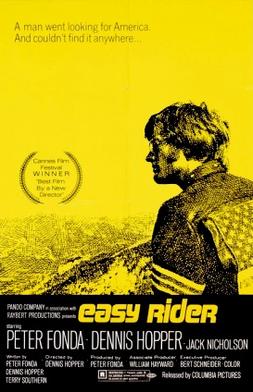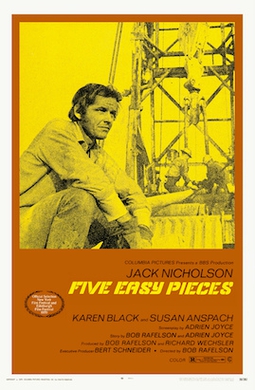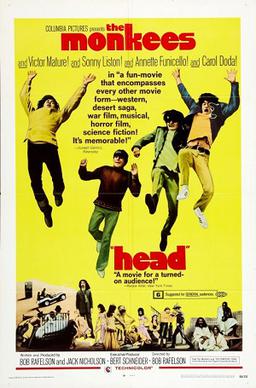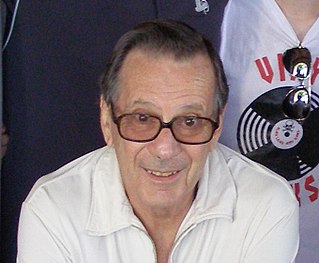Related Research Articles

The Monkees were an American pop rock band formed in Los Angeles in the mid-1960s. The band consisted of Micky Dolenz, Davy Jones, Michael Nesmith, and Peter Tork. Spurred by the success of the television show of the same name, the Monkees were one of the most successful bands of the 1960s. With international hits, four chart-topping albums and three chart-topping songs, the band sold more than 75 million records worldwide.

Easy Rider is a 1969 American independent road drama film written by Peter Fonda, Dennis Hopper, and Terry Southern, produced by Fonda, and directed by Hopper. Fonda and Hopper play two bikers who travel through the American Southwest and South, carrying the proceeds from a cocaine deal. The success of Easy Rider helped spark the New Hollywood era of filmmaking during the early 1970s.

Five Easy Pieces is a 1970 American drama film directed by Bob Rafelson, written by Carole Eastman and Rafelson, and starring Jack Nicholson, Karen Black, Susan Anspach, Lois Smith, and Ralph Waite. The film tells the story of surly oil rig worker Bobby Dupea, whose rootless blue-collar existence belies his privileged youth as a piano prodigy. When Bobby learns that his father is dying, he travels to his family home in Washington to visit him, taking along his uncouth girlfriend.

The Last Picture Show is a 1971 American coming-of-age drama film directed and co-written by Peter Bogdanovich, adapted from the semi-autobiographical 1966 novel The Last Picture Show by Larry McMurtry. The film's ensemble cast includes Timothy Bottoms, Jeff Bridges, Ellen Burstyn, Ben Johnson, Cloris Leachman, and Cybill Shepherd. Set in a small town in northern Texas from November 1951 to October 1952, it is a story of two high-school seniors and long-time friends, Sonny Crawford (Bottoms) and Duane Jackson (Bridges).

Head is a 1968 American satirical musical adventure film written and produced by Jack Nicholson and Bob Rafelson, directed by Rafelson, starring television rock group the Monkees and distributed by Columbia Pictures. A theatrical spin-off of the 1966–68 NBC television show and a swan song, it started production directly after completion of series production.

The King of Marvin Gardens is a 1972 American drama film. It stars Jack Nicholson, Bruce Dern, Ellen Burstyn and Scatman Crothers. It is one of several collaborations between Nicholson and director Bob Rafelson. The majority of the film is set in a wintry Atlantic City, New Jersey, with cinematography by László Kovács.

The Monkees is the debut studio album by the American band the Monkees. It was released on October 10, 1966 by Colgems Records in the United States and RCA Victor in the rest of the world. It was the first of four consecutive U.S. number one albums for the group, taking the top spot on the Billboard 200 for 13 weeks, after which it was displaced by the band's second album. It also topped the UK charts in 1967. The Monkees has been certified quintuple platinum by the RIAA, with sales of over five million copies.

Stuart Phillips is an American composer of film scores and television series theme music, conductor and record producer. He is perhaps best known for composing the theme tunes to the television series McCloud , Battlestar Galactica and Knight Rider.

New Monkees is the name of both an American pop rock music group and a 1987 syndicated television show featuring the group.

Screen Gems is an American film production company owned by Sony Pictures Entertainment, a subsidiary of Japanese multinational conglomerate, Sony Group Corporation. It has served several different purposes for its parent companies over the decades since its incorporation, initially as a cartoon studio, then a television studio, and later on as a film studio. The label currently serves as a film production that specializes in genre films, mainly horror.
Berton "Bert" Jerome Schneider was an American film and television producer.

Easy Riders, Raging Bulls: How the Sex-Drugs-and-Rock 'N Roll Generation Saved Hollywood is a book by Peter Biskind, published by Simon & Schuster in 1998. Easy Riders, Raging Bulls is about the 1960s and 1970s Hollywood, a period of American film known for the production of such films such as The Godfather,The Godfather Part II,The French Connection,Chinatown,Taxi Driver,Jaws,Star Wars,The Exorcist, and The Last Picture Show. The title is taken from films which bookend the era: Easy Rider (1969) and Raging Bull (1980). The book follows Hollywood on the brink of the Vietnam War, when a group of young Hollywood film directors known as the "movie brats" are making their names. It begins in the 1960s and ends in the 1980s.

Robert Jay Rafelson was an American film director, writer and producer. He is regarded as one of the key figures in the founding of the New Hollywood movement of the 1970s. Among his best-known films as a director include those made as part of the company he co-founded, Raybert/BBS Productions, Five Easy Pieces (1970) and The King of Marvin Gardens (1972) as well as acclaimed later films, The Postman Always Rings Twice (1981) and Mountains of the Moon (1990). Other films he produced as part of BBS include two of the most significant films of the era, Easy Rider (1969) and The Last Picture Show (1971). Easy Rider, Five Easy Pieces and The Last Picture Show were all chosen for inclusion in the Library of Congress' National Film Registry. He was also one of the creators of the pop group and TV series The Monkees with BBS partner Bert Schneider. His first wife was the production designer Toby Carr Rafelson.

A Safe Place is a 1971 American drama film written and directed by Henry Jaglom and starring Tuesday Weld, Orson Welles, and Jack Nicholson.
Donn Cambern was an American film editor with more than three dozen feature film credits. His editing of Romancing the Stone (1984) was nominated for an Academy Award for Best Film Editing along with fellow editor Frank Morriss, and his editing of Easy Rider (1969) has been noted as particularly innovative and influential. He was awarded the American Cinema Editors Career Achievement Award in 2004.

Drive, He Said is a 1971 American independent film directed by Jack Nicholson, in his directorial debut, and starring William Tepper, Karen Black, Bruce Dern, Robert Towne and Henry Jaglom. Based on the 1964 novel of the same name by Jeremy Larner, the film follows a disenchanted college basketball player who is having an affair with a professor's wife, as well as dealing with his counterculture roommate's preoccupation with avoiding the draft in the Vietnam War. The film features supporting performances by David Ogden Stiers, Cindy Williams, and Michael Warren. The screenplay was adapted by Larner and Nicholson, and included uncredited contributions from Terrence Malick.

The Monkees is an American television sitcom that first aired on NBC for two seasons, from September 12, 1966, to March 25, 1968. The series follows the adventures of four young men trying to make a name for themselves as a rock 'n roll band. The show introduced a number of innovative new-wave film techniques to series television and won two Emmy Awards in 1967, including Outstanding Comedy Series. The program ended in 1968 at the finish of its second season and has received a long afterlife through Saturday morning repeats and syndication, as well as overseas broadcasts.
Jules Stephen Blauner, commonly known as Steve Blauner, was Bobby Darin's manager, producer, and member of BBS Productions.
James M. Falkinburg, known in the entertainment industry as James "Jim" Nelson, was an American sound editor, film producer and post-production supervisor.
Igo Kantor was an American film producer and post-production executive. Through his company, Synchrofilm, he did post-production work for Easy Rider, Five Easy Pieces and The King of Marvin Gardens, and he produced Kingdom of the Spiders and Mutant.
References
This article needs additional citations for verification .(April 2011) |
- 1 2 J. Hoberman (28 November 2010). "One Big Real Place—BBS From Head to Hearts". Criterion Collection . Retrieved 2011-04-09.
- ↑ COLUMBIA PICTURES INDUSTRIES, INC. v. SCHNEIDER leagle.com July 26, 1977, Retrieved on August 31, 2014
- 1 2 Travis Crawford (December 16, 2010). "America Lost and Found: The BBS Story". Filmmaker . Retrieved 2011-04-09.